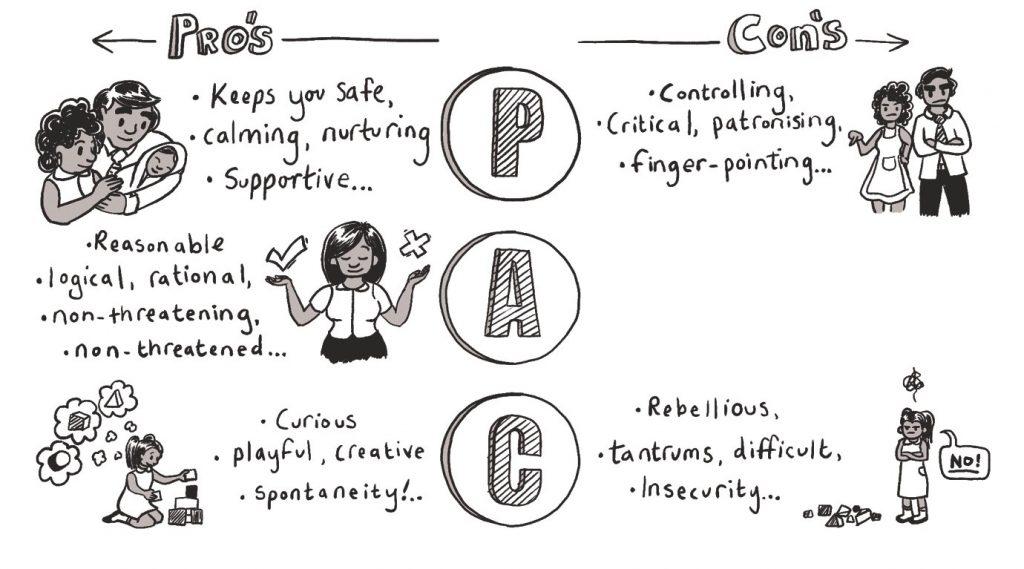Transactional Analysis as an Everyday Tool in Life
Transactional Analysis and the book “What Do You Say After Hello?” are seminal books written by Eric Berne, a renowned psychiatrist and founder of transactional analysis. First published in 1971, the book is a comprehensive examination of Berne’s theories and practices regarding social interactions and communication.
Berne’s basic argument is that our childhood experiences and the roles we play in different circumstances significantly shape the way we interact with others. He argues that individuals often engage in scripted interactions, where they follow predetermined patterns of behavior based on social roles and expectations. These scripts are often unconscious and can inhibit our ability to connect with others in meaningful ways.
To overcome these limitations, Berne suggests that individuals must become more aware of their own scripts and the roles they play in different situations. He encourages readers to become more authentic in their interactions, expressing their true feelings and desires rather than relying on preconceived notions of how they should behave. This approach allows individuals to engage in more genuine and fulfilling relationships.
Berne’s book is filled with numerous examples and anecdotes that illustrate his points. In addition, he introduces a variety of tools and techniques that readers can use to better understand themselves and others. For example, he introduces the concept of “hits,” which are verbal and nonverbal messages of recognition and attention that people use to communicate with each other.
Berne’s writing style is captivating and easy to understand, and his insights are still relevant today. His ideas have been influential in many fields, including psychology, counseling, and business. His emphasis on authenticity, self-awareness, and empathy are fundamental components of successful relationships, both personal and professional.
mama’s boys
Finally, “What Do You Say After Hello?” is a provocative and insightful book that provides valuable guidance for improving our social interactions and relationships. Berne’s ideas remain relevant and useful, making this a valuable resource for anyone who wants to better understand themselves and others. A must-read for those who want to improve their communication skills and deepen their connections with others.
One of the key takeaways from Berne’s book is the idea of scripts, which are predetermined patterns of behavior that we follow in our interactions with others. Berne argues that many of us are not even aware that we are following scripts, and this can lead to a lack of authenticity and a failure to truly connect with others. By becoming more aware of our scripts, we can break free from them and engage in more meaningful interactions with those around us.
Berne also introduces the concept of games, which are ways in which we interact with others to satisfy our emotional needs. He suggests that many of us engage in “mind games” without even realizing it, and these games can be a major obstacle to effective communication and healthy relationships. By understanding the games we play, we can begin to avoid them and build more honest and authentic relationships.
Another key theme of the book is the importance of empathy and understanding in our interactions with others. Berne argues that by putting ourselves in someone else’s shoes, we can gain a deeper understanding of their perspectives and needs. This in turn allows us to communicate more effectively and build stronger relationships.
Overall, “What Do You Say After Hello?” is a book that is packed with insight and practical advice for anyone who wants to improve their communication skills and deepen their connections with others. It is a timeless classic that is still relevant today, and it is a must-read for anyone interested in personal development, psychology, or interpersonal relationships. By following Berne’s guidance, we can all become more authentic, empathetic, and effective communicators and build stronger and more fulfilling relationships with those around us.

Keywords: autonomy, psychotherapy, psychotherapist Zagreb, transactional analysis, therapy, Licensed therapist near me in Manhattan NYC, Affordable therapy services in New York State, Holistic psychotherapy sessions in NYC, Somatic Experiencing therapy for trauma recovery in New York City, NARM therapy in Brooklyn, Licensed couples therapy in Manhattan, Gestalt therapy near me in NYC, Marriage counseling in Queens NYC, Therapy for anxiety treatment in NYC, Experienced psychotherapist in New York, Licensed psychotherapist near me in NYC, Somatic Experiencing therapy sessions in New York, Trauma therapy and counseling in Manhattan, Gestalt therapy sessions in New York City, Therapy sessions for emotional regulation in New York, Trauma therapy near me in Brooklyn New York, Licensed mental health therapist in Manhattan NYC, Depression therapy in New York, New York City therapist experienced in PTSD treatment
*Photo: GettyImages
*Contact: Make an appointment
*For companies: Creative manager
Fear of making a mistake









